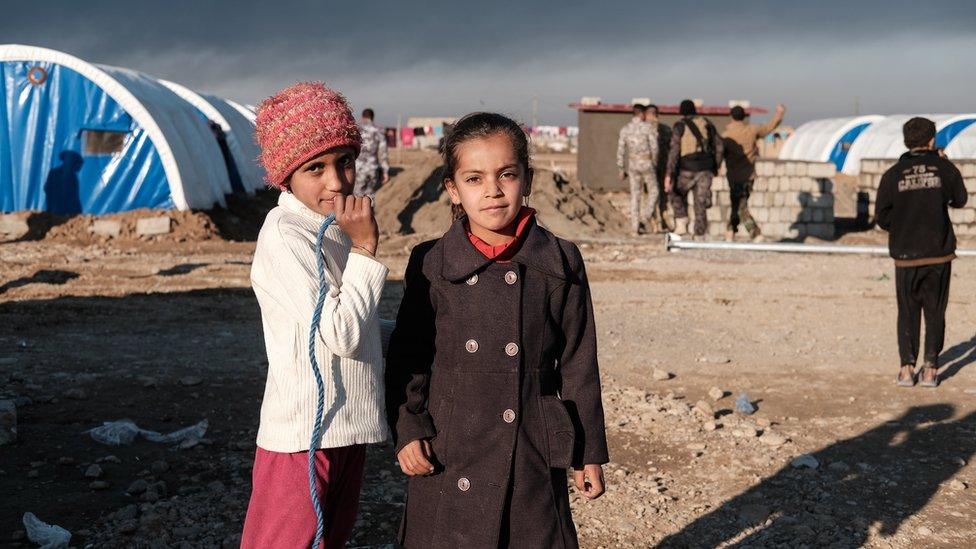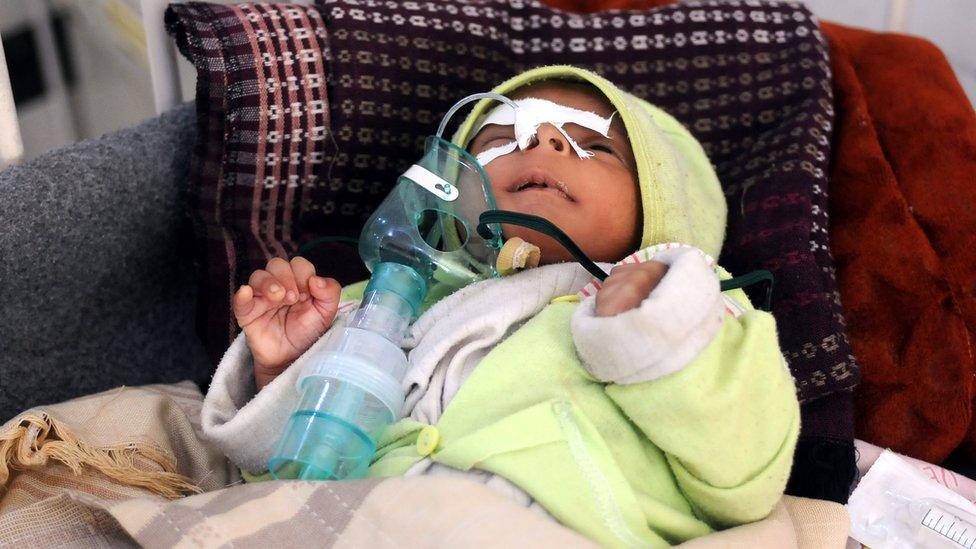Brexit risk for UK aid as Swiss cut off from EU funding
- Published

Residents of the Qayyarah Jadah camp near Mosul, photographed in January 2017
Some of the UK's major aid agencies may be facing a funding shortfall once Britain leaves the European Union.
Many had hoped that funding might continue after Brexit, especially if a deal is agreed.
Aid agencies in non-EU member Switzerland have regularly received EU funding, based on the strong bilateral ties Switzerland has with the bloc.
But an EU letter sent to 10 Swiss non-governmental organisations suggests problems ahead.
It explains that as from 1 January this year, Swiss agencies will no longer be eligible for funding. The reason: there is no longer "a suitable legal basis" to award money to organisations not based in the EU.
Oxfam, Save the Children and numerous other UK based non-governmental organisations regularly receive funding from the European Commission's department for humanitarian aid, ECHO.
But that funding - on paper at least - is based on the fact that the recipient organisation is headquartered in an EU member state.
UK aid agency officials say they have been making "contingency preparations for months," but still cannot be sure exactly what will happen.
Political casualties of Brexit?
Swiss agencies receive funding based on the merit of the aid project they proposed.
For Caritas Switzerland, currently running a "Quality of Learning and Child Protection" programme in Syria worth €1.2m (£1m; $1.3m) it came as a shock.
"We were informed at very short notice," said Stefan Gribi. "It's very unusual at this international level to communicate such a decision just ten days before it takes effect."
"We're surprised that the interpretation of the same legal situation has changed from one day to another," added Alexander Koch of World Vision Switzerland. "We didn't expect this partnership to be ended so abruptly, without prior discussion or time to work on a compromise."
One of Switzerland's best-known humanitarian groups, the Red Cross, is legally classified as an international organisation, and so will not be affected.
ECHO has insisted its decision to end the Swiss funding, worth around €50m a year, is based purely on a legal reassessment.
But the Swiss agencies are not so sure.
They suspect they are casualties of the EU's Brexit planning - if Brussels is thinking of ending funding to aid agencies in soon to be non-member Britain, then why not signal that risk by ending funding to Switzerland?
What's the damage?
The potential loss to major UK organisations like Oxfam or Save the Children is huge.
Last year Oxfam received around €23m from ECHO to fund projects in Yemen, Iraq and Bangladesh. ECHO is a major donor to Save the Children too, supporting projects in Syria, South Sudan and Yemen.
Some UK aid agencies say the danger signs are already obvious. UK project managers have reportedly been advised by EU representatives not to submit new proposals, and others say they have been told funding contracts will have to wait until Brexit terms are finally agreed.

UK-based Save the Children received European funding for its work in war-torn Yemen
The UK's Department of International Development offers some comfort in an advice paper for aid agencies, external, suggesting "the government commits to funding the post-March 2019 outputs of any programme funded from ECHO's core budget, where a UK organisation is the lead consortium partner or sole implementer. This will apply only in a no deal scenario when ECHO terminates funding."
But this only commits to finance existing projects so that they do not finish abruptly, and makes no mention of future aid funding.
"We're aware that the ability of UK NGO's to bid for EU funds will depend on the outcome of the Brexit talks," a spokesman for Oxfam said. "We urge all involved to minimise the negative impact on those for whom aid provides a vital lifeline."
Who suffers?
In Switzerland, affected agencies have been told that programmes already under way can at least continue to their expected end.
Caritas' work with children in Syria will not be affected. But no further projects will be approved, so Caritas proposals for several further aid programmes worth €10m - and for which it had expected approval at the end of this month - will not go ahead.
And from now on Swiss NGO's cannot propose or lead ECHO funded programmes, meaning that expertise in humanitarian work which they have built up over years will not be used.
"We focus on the most vulnerable people in the most fragile countries… and this is in-line with ECHO's strategy," said Alexander Koch.
"I wonder, who will suffer because of this decision? It's in nobody's interest."
- Published7 March 2016

- Published30 December 2020

- Published6 February 2019
